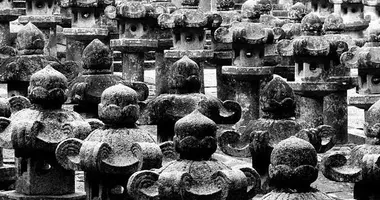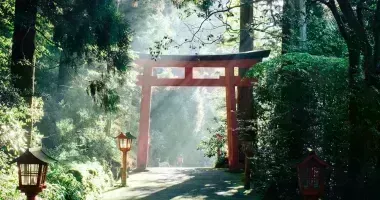Japanese Baseball
Japanese baseball: read a series of articles on Japanese baseball including going to a game in Japan, high-school baseball & foreign players in Japan.
Japanese Baseball
Japanese Baseball and the Majors yakyu please not baseball

The batter hits a slow roller toward third. The third-baseman charges, picks up the ball, and fires accurately toward first - just in time to nip the runner, who, for some reason, has decided to dive headfirst into the bag. OUT! the umpire cries, prompting one of the team's managers to sprint onto the field to protest, a protest that does not follow the usual profanity laced diatribe favored by North American managers, but may instead take the form of pushes, shoves, and perhaps even a kick or two. Amazingly, the manager is not ejected.
by Nik Yasko
Japanese Impact Mostly Hype? the state of the game

The Japanese media, along with the occasional deluded Westerner, claims that the success of Ichiro, Matsui and Nomo has justified the Japanese approach to baseball. An article in the October issue of Sports Graphic Number states that American baseball men have learned from Japanese ballplayers: "after all, they're not stupid," says the article. "Gone are the days when American ball clubs no longer practice." Right. We can easily imagine how managers frantically scurried around learning Japanese baseball secrets after seeing the play of the great Tsuyoshi Shinjo. And no doubt Tony LaRussa lectures his Cardinals players to emulate the batting of So Taguchi.
by Nik Yasko
Japanese Central League (CL)

There are six teams in the Japanese Central League (CL):
Yomiuri Giants, Hanshin Tigers, Chunichi Dragons, Hiroshima Toyo Carp, Tokyo Yakult Swallows, and the Yokohama BayStars.
Read a full introduction to all the Central League teams, their history, managers, stadiums and present players.
by Jason Coskrey
Japanese Pacific (PL)

There are six teams in the Japanese Pacific League (PL):
Saitama Seibu Lions, Orix Buffaloes, Hokkaido Nippon Ham Fighters, Chiba Lotte Marines, Tohoku Rakuten Golden Eagles, and the Fukuoka Softbank Hawks.
Read a full introduction to all the Pacific League teams, their history, managers, stadiums and present players.
by Jason Coskrey
Yu Darvish

Young Hokkaido Nippon Ham Fighters pitcher Yu Darvish has MLB teams, fans and scouts drooling as he continues to dominate Japanese baseball.
Darvish earned the second Pacific League MVP Award of his young career in 2009 and is showing no signs of slowing down.
Darvish has won both the Japan Series and World Baseball Classic, helped the Fighters win the PL pennant three times and was a winner in the Asia Series.
by Jason Coskrey
An Introduction to Japanese Baseball - history, teams, stadiums

An introduction to baseball in Japan including the history of the game since the early days in the 1870s, the development of professionalism and the pro-leagues, the relationship of Japanese and US baseball with a look at foreign players in Japan and Japanese players in the US.
More on the recent problems of baseball in a troubled Japanese economy plus a full team profile for all the clubs in the Central and Pacific Leagues with details of stadiums, addresses, tickets and how to get to see a professional baseball game in Japan.
Japan's Ballparks a day out at the kyujo

One doesn't have to be a baseball fan to enjoy the experience of a live game in Japan. Certainly, fans will appreciate the high quality of baseball as evidenced by Japanese players such as Hideo Nomo, Ichiro Suzuki and Hideki Matsui, Daisuke Matsuzaka and Yu Darvish all proving their worth in the American Major Leagues.
However, a growing number of expatriates not previously showing an interest in the sport, have ventured to the kyujo (ballpark) and returned with a new passion for the game.
by David Peffley
The Meaning of Ichiro: Robert Whiting's The New Wave From Japan and the Transformation of our National Pastime

In his new book The Meaning of Ichiro: The New Wave From Japan and the Transformation of our National Pastime American author Robert Whiting shifts his focus from Americans playing in Japan to Japanese playing baseball in the American Major Leagues. Outside of Japan, little is known about these players other than their batting averages or ERAs.
And while some players profiled still remain somewhat elusive—especially the press-wary Nomo—a clear picture of the obstacles Japanese players face in getting to the Major Leagues and their time spent in the US emerges.
Brad Quinn
Ichiro Baseball Superstar

Ichiro Suzuki's exploits in Major League Baseball have made him a legend in Japan. Oozing cool and style, he's captured the hearts of two baseball-crazy nations with acrobatic catches and a zen-like approach to batting.
Long before he was a star in the U.S., Suzuki was terrorizing NPB pitching staffs. Considered undersized, he was drafted in the fourth-round of the 2001 NPB draft by the Orix Blue Wave.
Jason Coskrey
Japanese - US Baseball worlds not so far apart?

As spring training begins, both the American and the Japanese media are keeping a close eye on the new New York Met shortstop, Kazuo Matsui. The slick-fielding, hot-hitting, fleet of foot, and now very rich Matsui is the latest in the series of Japanese baseball phenomena who have come to America to accept the challenge of playing in what the Japanese collectively refer to as dai-riigu - The Big Leagues. Is the quality gap narrowing between MLB and the Japanese game?
David Peffley thinks so.
Japanese - US Baseball worlds far apart?

Just how well have Japanese players performed in the U.S.? Many have failed. Masao Kida, Tsuyoshi Shinjo, Hideki Irabu and Mac Suzuki have all returned to Japan after posting poor numbers overseas.
And of the successes, no Japanese player has exceeded his statistical Japanese league performance while playing in the major leagues. Even Ichiro's success at the Seattle Mariners has been somewhat muted. Is the quality gap narrowing between MLB and the Japanese game?
Nik Yasko thinks not.
Koshien Japan's national high school baseball finals

Easily surpassing in popularity any other high school sporting event, anywhere in the world, tradition and symbolism are just as important at Koshien as the sporting spectacle. It attracts up to a million spectators over the ten days, not to mention millions more following proceedings on television, radio and in national newspapers. Many who take little notice of the big leagues take an active interest in Koshien, not least of which are the hordes of high-schoolers that are bussed to Nishinomiya from all over the country to support their team.
by Will Yong
World Baseball Classic Japan win the inaugural World Baseball Classic

Since 1903, baseball's "world series" has been exclusively an American affair, pitting the winner of the United States' National and American Leagues against each other.
And as baseball's popularity around the globe has increased, many fans have clamored for a true world series. That dream has come to fruition. In March 2006 the inaugural World Baseball Classic was played to an enthusuastic worldwide audience.
The tournament featured 16 teams from five continents - and Japan won!
by David Peffley
Japanese Baseball Play Off System Climax Series

While professional baseball in Japan shares a wealth of similarities with it's MLB counterpart, the playoff system is not one of them.
In Japan the playoffs consist of three teams from both the Central and Pacific Leagues competing in their respective league's Climax Series.
The winners of the two Climax Series then advance on to compete in the Japan Series, a seven-game series to decide the NPB Champion.
Jason Coskrey
Tokyo Yakult Swallows Meiji Jingu Stadium

The Yakult Swallows are one of the most beloved Japanese baseball teams and are held in deep affection by their many fans. The Tokyo Yakult Swallows play their home games at the time honored Meiji Jingu Stadium, the second oldest ballpark in Japan, after Koshien, with all areas of the stadium steeped in history. With tickets easier to come by than at Yomiuri Giants' games at Tokyo Dome, a Swallows' game makes for a fun baseball experience on a visit to the Japanese capital.
Christopher KL Lau
Masanori Murakami First Japanese Major Leaguer

20-year-old Masanori Murakami was the first Japanese player to play in the U.S. major leagues as a pitcher for the San Francisco Giants.
In 1964, Murakami made his debut at Shea Stadium in front of 40,000 screaming fans. To calm himself on the way in from the bullpen to the mound, he hummed the song "Sukiyaki (Japanese title: 上を向いて歩こう, or I Look Up as I Walk).
Murakami finished that season pitching in nine games with a 1-0 record and a 1.80 ERA, striking out 15 and walking just one batter in 15 innings.
Marshall Hughes
Kenichi Iwamoto - Translator To Trey Hillman and Tsuyoshi Shinjo
Self-confessed baseball fanatic Kenichi Iwamoto went to college in the US to try his luck in life after a junior high school injury ruled him out playing the game at a high level. Iwamoto eventually became the translator for Tsuyoshi Shinjo at the New York Mets and Trey Hillman in Japan, when the American managed the Hokkaido Nippon Ham Fighters.
Andrea Marcus








